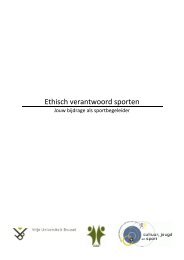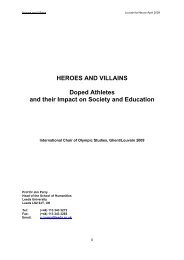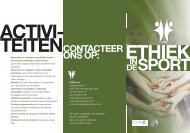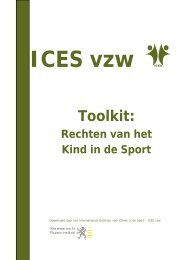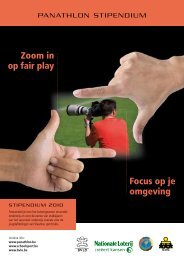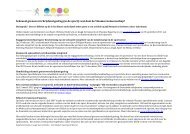Part 3 GLOBAL ISSUES: HARASSMENT AND ABUSE RESEARCH
Part 3 GLOBAL ISSUES: HARASSMENT AND ABUSE RESEARCH
Part 3 GLOBAL ISSUES: HARASSMENT AND ABUSE RESEARCH
You also want an ePaper? Increase the reach of your titles
YUMPU automatically turns print PDFs into web optimized ePapers that Google loves.
this study. 14 It is important to note that the elements of the model interact over time<br />
to influence the core category. For example, the consequences of a coach’s<br />
response to role ambiguity will influence how he experiences role ambiguity and<br />
may influence the conditions for experiencing role ambiguity in the future.<br />
The starting point for the model is the prerequisite conditions that lead to the<br />
coach being aware of child protection issues. The specific conditions that were<br />
grounded in the data included: personal experience or knowledge of child protection<br />
allegations, increased cultural awareness of child abuse, media coverage of child<br />
abuse and increased legislation on child protection issues. These prerequisite<br />
conditions influenced the conditions leading to role conflict and ambiguity and<br />
included: awareness/acceptance of child protection issues, coaching behaviours<br />
and congruence (or incongruence) of coaching behaviours and child protection<br />
guidelines. Once role conflict or ambiguity was experienced by the coaches there<br />
were three main strategies for attempting to resolve this: first, defining (or redefining)<br />
what it means to be an effective coach, secondly assessing one’s own<br />
morals standards and intentions and thirdly assessing the risks involved in not<br />
adhering to child protection guidelines.<br />
Reflections<br />
A common limitation of conducting research with humans is that it is difficult<br />
to ascertain whether participants are responding openly, or if they are only<br />
responding in a socially desirable manner. 28, 29 The use of focus groups potentially<br />
increases the likelihood of such responses when participants may be concerned<br />
about the other participants unfavourably judging them. While this may have<br />
happened to some degree in the focus groups there was sufficient variability in<br />
responses to indicate that this was not a serious problem. In two of the individual<br />
interviews, however, the lead researcher felt that the participants were withholding<br />
information. For example, the convicted coach denied that the abuse happened. In<br />
the case of the coach who was cleared of allegations, he was reluctant to talk about<br />
the situation, and the researcher did not pressure him into discussing the details of<br />
the case.<br />
A further limitation is that, as this was an exploratory study, the emerging<br />
themes reported in this study are not generalisable to the wider population of<br />
65<br />
65



